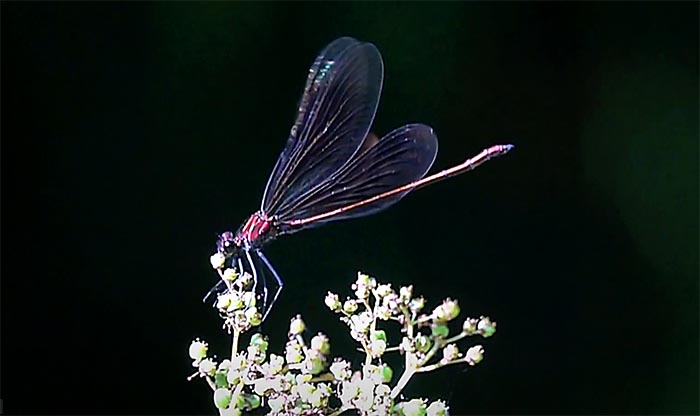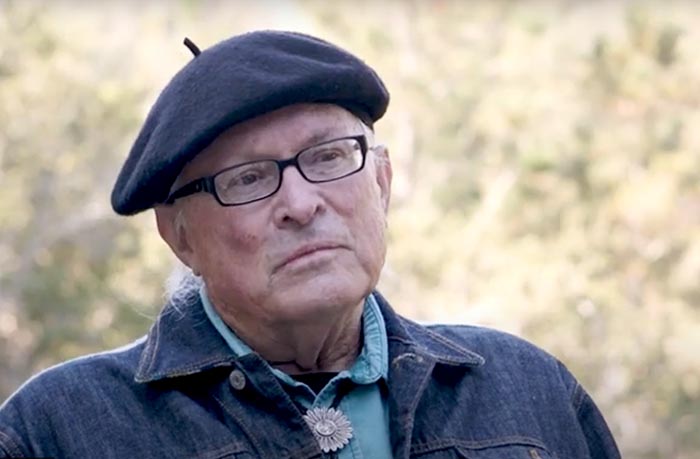News & Views
INTRODUCING… Living in the Time of Dying: a film about climate change
Jim Griffin presents a recent work by Australian film-maker Michael Shaw

Living in the midst of a climate emergency, or catastrophe – language has grown stronger over the last few years – is now very much a matter of public concern. This recent film, Living in the Time of Dying, made by the Australian film-maker Michael Shaw in response to his own dawning awareness of species extinction, asks bluntly: “Are humans likely to become extinct?” To find answers, Michael sold his home and with his partner Michelle Walker set off on a journey around the world to interview four people who have been speaking on the issue. The result is an unexpectedly beautiful and life-affirming film.
There is no focus here on technological solutions, nor on political responses. The realities of the geo-physical situation – melting ice caps and rising sea levels – are laid out by the journalist Dahr Jamail, author of ‘The End of Ice’,[1] and the small-scale and spiritual responses of Deep Adaptation movement are highlighted by its founder, Professor Jem Bendell.[2] But the overall message is that, as a world community, we have lost our sense of the sacredness of the natural world. We have become like Icarus, trying to fly too high above the world, trying to reach the stars whilst ignoring the wonders of our planet and home.
It may or may not be too late to save ourselves, but the people featured here argue that it is still possible for us to regain a renewed life-giving relationship with our world. The writer and Dharma teacher Catherine Ingrams [3] talks about positive ways of facing the sadness that many people feel, quoting Jonathan Franzen: “ Even in a time of dying new loves continue to be born”.[4] Whilst Dahr Jamail argues maintains that “the single most important thing right now is to listen to the earth… if each one of us really does this as closely as we can, I truly believe that we will get what is ours to do.”
Perhaps the most powerful interview is with the elder, author and citizen of the Chiricahua Apache Nation, Stan Rushworth, talking from the perspective of the Native American tradition. He speaks movingly of his own experiences of nature, and maintains that our adaptation requires us…
“ … coming back into believing in ourselves as human beings. It is not human beings who have made things so colossally dire; it is a particular type of thinking – a predatory kind of thinking. That predatory psychology is justified as being the natural state of Man. But it is not true, and everyone knows in the deepest part of their heart that they are way better than that…
He concludes:
“I don’t know where things are going, I can’t predict that, but all the elders that I know of say that we have a sacred obligation towards how we are going to be here, at this moment.”
See the film here…
You can see more about the background of the film on www.livinginthetimeofdying.com.
Michael Shaw is continuing his interview project, and you will find additional videos of conversations with the Derek Jensen and Carolyn Baker on the site.
Sources (click to open)
Banner image: screen shot from Living in a Time of Dying, 49:38.
[1] DAHR JAMAIL, The End of Ice (The New Press, 2019).
[2] JEM BENDELL, ‘Deep Adaption: A Map for Navigating Climate Tragedy’ (IFLAS Occasional Paper 2), https://lifeworth.com/deepadaptation.pdf.
[3] CATHERINE INGRAMS, ‘Facing Extinction’, https://www.catherineingram.com/facingextinction/.
[4] JONATHAN FENZEN , The End of the Earth (The Fourth Estate, 2019).
More News & Views
Poems for These Times: 18 – New Year 2024
Benjamin Zepahniah | Faceless
“You have to look beyond the face
to see the person true
Down within my inner space
I am the same as you…”
Introducing… ‘Tiger Work’ by Ben Okri
Barbara Vellacott reads from and discusses a new book of stories, parables and poems about climate change
Book Review: “Elixir: In the Valley at the End of Time” by Kapka Kassabova
Charlotte Maberly reviews a book about the search for wholeness, and a heartfelt plea to reclaim our spiritual, physical and emotional unity with nature
Book Review: “Work: A Deep History” by James Suzman
Richard Gault reviews a new book which takes a radical approach to contemporary work culture
Introducing… Bernardo Kastrup and Swami Sarvapriyananda
Charlotte Maberly appreciates a wide-ranging video conversation about Eastern and Western concepts of the self and mind
Connecting Threads on the River Tweed
Charlotte Maberly investigates an innovative project which explores cultural engagement as the driver of ecological change
FOLLOW AND LIKE US
——————————————
——————————————
——————————————
If you enjoyed reading this article
Please leave a comment below.
Please also consider making a donation to support the work of Beshara Magazine. The magazine relies entirely on voluntary support. Donations received through this website go towards editorial expenses, eg. image rights, travel expenses, and website maintenance and development costs.
READERS’ COMMENTS
6 Comments
Submit a Comment
FOLLOW AND LIKE US

Love this vast earth
Love this vast earth
what it is.
Love all of it,
every smallest piece has its place.
Seek the good in everything,
it is there.
See the beauty,
it is there.
Don’t stop at the appearance
outside,
find the meaning
inside.
Not this, not that
say the mystics-
seek through negation
and affirmation.
The truth will out,
It wants to be found,
it is seeking you
to find itself in you.
Why resist?
Richard Twinch Oxford 8th Nov 2021
Well, I really wanted to like and appreciate the film, “Living in the Time of Dying,” but the truth is that this film fails in a very serious way. My partner and I are not climate deniers. Far from it, we are practically the choir to whom this film is preaching. But we work hard and think hard and, frankly, we’re tired and we need some sustenance, something to help us keep going and functioning in a world we see going down.
I had hoped this film, described as “surprisingly beautiful and life affirming,” would provide a balanced, motivating, even inspiring message that would help us continue the work of living a–shall I say?–climate-conscious life. But it did not do that at all. Its message is so bleak and so emotionally confining, so mentally limiting that at around minute 36, my partner declared, “Alright, I’ve had enough of this!” and left the room.
The problem, you see, is that he is exactly the kind of person whose creativity and writing talents could be of service to raising climate consciousness. But not when you beat him down with a film like this. I put on my earbuds and watched the rest of the film to see if it would have any redeeming value. There were some inspiring thoughts expressed beginning around minute 39, but in a 54-minute film, it was far too late. And that’s a shame because it was my partner who really needed the support far more than me.
As a linguist, I can tell you, if you want to communicate with someone who does not speak your language, it is up to YOU to learn theirs. I don’t know what, exactly, the point of this film was intended to be, but if it’s to raise people’s consciousness around climate change, it fails miserably–and I mean miserably.
PS: And on Earth Day, no less!
something to help us keep going and functioning in a world we see going down.
not speak your language, it is up to YOU to learn theirs. I don’t know what,
would provide a balanced, motivating, even inspiring message that would help